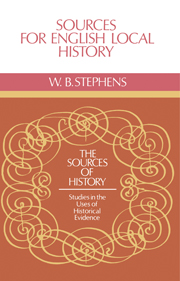Book contents
- Frontmatter
- Contents
- General editor's introduction
- Preface to the second edition
- Preface to the first edition
- Abbreviations
- 1 Introduction
- 2 Population and social structure
- 3 Local government and politics
- 4 Poor relief, charities, prices and wages
- 5 Industry, trade, and communications
- 6 Agriculture
- 7 Education
- 8 Religion
- 9 Houses, housing, and health
- Index
3 - Local government and politics
Published online by Cambridge University Press: 04 February 2010
- Frontmatter
- Contents
- General editor's introduction
- Preface to the second edition
- Preface to the first edition
- Abbreviations
- 1 Introduction
- 2 Population and social structure
- 3 Local government and politics
- 4 Poor relief, charities, prices and wages
- 5 Industry, trade, and communications
- 6 Agriculture
- 7 Education
- 8 Religion
- 9 Houses, housing, and health
- Index
Summary
The variety of sources available for the study of local government in England is considerable. Some of the chief sources, however, have been described in detail for other purposes in other chapters so that some cross references may be made to avoid unnecessary repetition. The control of local administration in its fiscal, military, and judicial aspects in medieval and early modern times was to a great extent in the hands of royal officials, particularly sheriffs, coroners, itinerant justices, constables, and castellans. Information on their activities must be sought in the records of the central government. The pipe rolls (P.R.O. Class E.372), some of which are published, are perhaps the most valuable of these records for the local historian. They contain the financial accounts of sheriffs and other royal officials in the counties and provide much evidence not only on the local sources of royal revenue but of Crown expenditure in different places. They may be supplemented by the Exchequer K.R. and L.T.R. memoranda rolls, and Exchequer accounts various. The accounts of escheators (local officials concerned with certain types of royal revenue), originally included in the pipe rolls, were enrolled separately from 1323, and may throw light on, among other matters, the landholdings of local families. Chancery records provide another corpus of materials for the history of local administration and justice. The charter, close, fine, and patent rolls record grants of land and privileges to individuals and corporate bodies and orders to local royal officials. The records of coroners, and justices in eyre and, from the fourteenth century, the justices of assize are valuable for judicial matters.
- Type
- Chapter
- Information
- Sources for English Local History , pp. 71 - 98Publisher: Cambridge University PressPrint publication year: 1981



